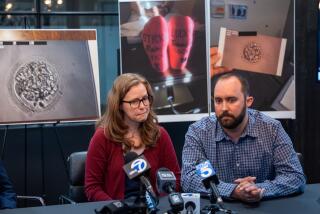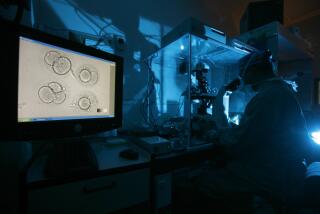2 Japanese Hemophiliacs File AIDS Suit
- Share via
TOKYO — Two hemophiliacs infected with the AIDS virus filed a ground-breaking lawsuit Monday in Osaka District Court, suing the government and two Japanese drug companies for failing to protect them from imported supplies of contaminated blood products.
Fumio Akase, 52, a calligrapher from Ehime prefecture, and a fellow plaintiff from Kyoto whose name was not made public demanded $1.77 million in damages, alleging that they were infected with the human immunodeficiency virus, or HIV, because the government was negligent in screening imported blood products.
Also named as defendants in the suit were Osaka-based Green Cross Corp., a manufacturer of plasma derivatives, and a Tokyo pharmaceutical company, Baxter Ltd.
The suit alleges that the companies continued to market tainted blood-clotting agents after 1983 despite clear warnings from U.S. health officials and the availability of tests that would have detected the virus.
“This is a major medical disaster,” said Yukio Yasuda, one of a group of lawyers representing the two plaintiffs. “The tragedy won’t end with mere moral penance. The victims won’t find satisfaction until the government and the drug companies accept legal responsibility.”
Although AIDS-related damage suits have become commonplace as the epidemic mushrooms in the United States, it was the first legal action of its kind in Japan, where the spread of acquired immune deficiency syndrome remains limited and where social conventions discourage litigation as a means of settling disputes.
“We’ll probably be seeing many more lawsuits like this in the future,” lawyer Yasuda said.
Of the 1,065 people in Japan identified by the government as HIV carriers as of the end of 1988, 92% were hemophiliacs believed to have contracted the virus through imported blood, mostly of U.S. origin. Patient-advocacy groups estimate that about 2,000 hemophiliacs are infected with HIV. More than half of the 97 confirmed cases of AIDS in Japan have involved hemophiliacs.
Delay by Ministry
Like Akase, many of those affected were exposed to the virus after the U.S. Centers for Disease Control alerted the public to the risk of HIV infection through blood transfusions and the U.S. Food and Drug Administration approved, in 1983, a heat-treatment method that eliminates the virus from coagulant agents used by hemophiliacs.
The Japanese Health and Welfare Ministry did not authorize production of blood products using the heat-treatment method until July, 1985, a delay that Akase and his co-plaintiff say resulted in unnecessary exposure.
Earlier this year, the government began compensating some patients infected with the AIDS virus through blood products, using a fund contributed by drug companies.
“We are sincerely sympathetic with these patients,” said Tadaharu Goto, an official with the Health and Welfare Ministry. “But the government based its policy on the scientific knowledge available at that time, and we believe we have no legal responsibility.”
Green Cross issued a statement Monday saying: “We are constantly making efforts to improve the products we supply to the medical industry. With a disease like AIDS, for which there is no prior experience, we establish our policies while receiving guidance from the government.”
Ichiro Henmi, a spokesman for Baxter, said the company had “done its utmost” to adhere to procedures in force at the time of the alleged contamination.
Akase reportedly said he noticed his health was deteriorating in the fall of 1985, when he started catching colds and suffering from diarrhea. He was diagnosed as infected with HIV in November, 1987.
In a recent interview with the newspaper Mainichi, Akase said he hoped his lawsuit would help alleviate some of the shame and social discrimination experienced by Japanese AIDS patients and their families.
More to Read
Sign up for Essential California
The most important California stories and recommendations in your inbox every morning.
You may occasionally receive promotional content from the Los Angeles Times.













